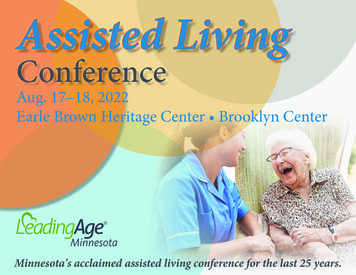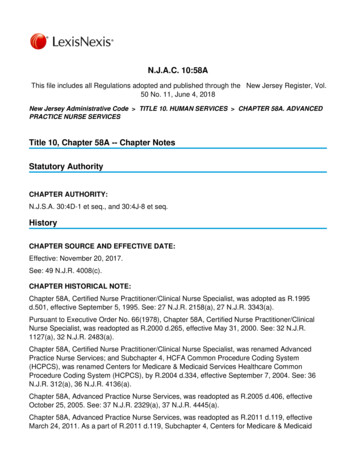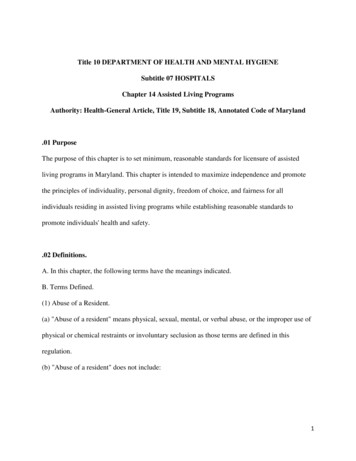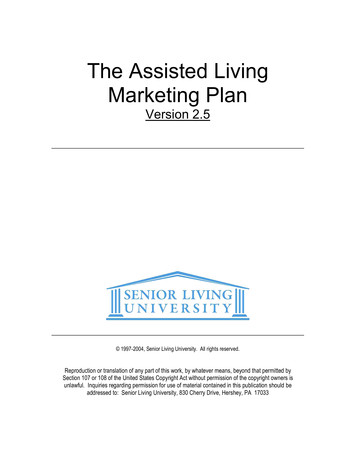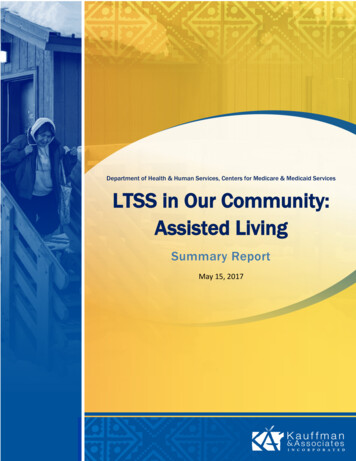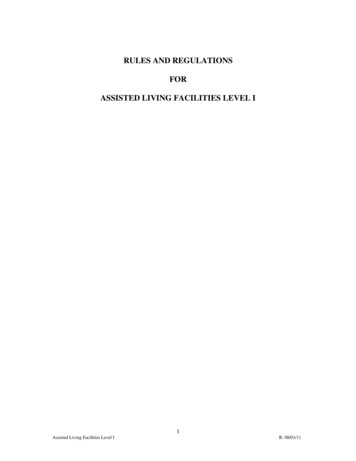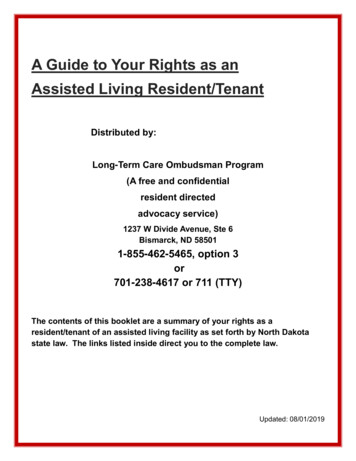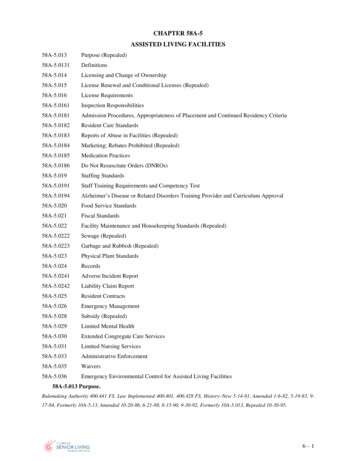
Transcription
CHAPTER 58A-5ASSISTED LIVING FACILITIES58A-5.013Purpose (Repealed)58A-5.0131Definitions58A-5.014Licensing and Change of Ownership58A-5.015License Renewal and Conditional Licenses (Repealed)58A-5.016License Requirements58A-5.0161Inspection Responsibilities58A-5.0181Admission Procedures, Appropriateness of Placement and Continued Residency Criteria58A-5.0182Resident Care Standards58A-5.0183Reports of Abuse in Facilities (Repealed)58A-5.0184Marketing; Rebates Prohibited (Repealed)58A-5.0185Medication Practices58A-5.0186Do Not Resuscitate Orders (DNROs)58A-5.019Staffing Standards58A-5.0191Staff Training Requirements and Competency Test58A-5.0194Alzheimer’s Disease or Related Disorders Training Provider and Curriculum Approval58A-5.020Food Service Standards58A-5.021Fiscal Standards58A-5.022Facility Maintenance and Housekeeping Standards (Repealed)58A-5.0222Sewage (Repealed)58A-5.0223Garbage and Rubbish (Repealed)58A-5.023Physical Plant Standards58A-5.024Records58A-5.0241Adverse Incident Report58A-5.0242Liability Claim Report58A-5.025Resident Contracts58A-5.026Emergency Management58A-5.028Subsidy (Repealed)58A-5.029Limited Mental Health58A-5.030Extended Congregate Care Services58A-5.031Limited Nursing Services58A-5.033Administrative Enforcement58A-5.035Waivers58A-5.036Emergency Environmental Control for Assisted Living Facilities58A-5.013 Purpose.Rulemaking Authority 400.441 FS. Law Implemented 400.401, 400.428 FS. History–New 5-14-81, Amended 1-6-82, 5-19-83, 917-84, Formerly 10A-5.13, Amended 10-20-86, 6-21-88, 8-15-90, 9-30-92, Formerly 10A-5.013, Repealed 10-30-95.6–1
58A-5.0131 Definitions.In addition to the terms defined in section 429.02, F.S., the following definitions are applicable in this rule chapter:(1) “Advertise” means any written, printed, oral, visual, or electronic promotion, statement of availability,qualifications, services offered, or other similar communication appearing in or on television, radio, the Internet,billboards, newspapers, magazines, business cards, flyers, brochures or other medium for the purpose of attractingpotential residents to an assisted living facility. A complimentary listing of a licensed facility’s name, address, andtelephone number in the telephone directory is not considered advertising.(2) “Agency Central Office” means the Agency for Health Care Administration Assisted Living Unit (ALU),located at 2727 Mahan Drive, Mail Stop 30, Tallahassee, FL 32308-5403. The ALU telephone number and orida.com/MCHQ/Health Facility Regulation/Assisted Living/alf.shtml.(3) “Agency Field Office” means the Agency for Health Care Administration’s Office in a particular geographicarea. Information regarding local offices is available online at: http://ahca.myflorida.com/mchq/index.shtml#six.(4) “Apartment” means a self-contained dwelling unit with a bathroom, kitchen area, and living and sleepingspace that is contracted for use as a residence by one or more persons who maintain a common household.(5) “Anti-Embolism Stockings and Hosiery” means prescribed close-fitting elastic-type coverings for therapeutictreatment of the legs. They may be knee high or thigh high length and have transparent, open-toe, or similar footdesign.(6) “Assistance with Activities of Daily Living” means individual assistance with the following:(a) Ambulation – Providing physical support to enable the resident to move about within or outside the facility.Physical support includes supporting or holding the resident’s hand, elbow, or arm; holding on to a support belt wornby the resident to assist in providing stability or direction while the resident ambulates; or pushing the resident’swheelchair. The term does not include assistance with transfer.(b) Bathing – Assembling towels, soaps, or other necessary supplies; helping the resident in and out of the bathtubor shower; turning the water on and off; adjusting water temperatures; washing and drying portions of the body thatare difficult for the resident to reach; or being available while the resident is bathing.(c) Dressing – Helping residents to choose, put on, and remove clothing.(d) Eating – Helping residents with or by cutting food, pouring beverages, or feeding residents who are unable tofeed themselves.(e) Grooming – Helping residents with shaving, oral care, care of the hair, or nail care.(f) Toileting – Assisting the resident to the bathroom, helping the resident to undress, positioning the resident onthe commode, and helping the resident with related personal hygiene including assistance with changing an adult briefand assistance with the routine emptying of a catheter or ostomy bag.(7) “Assistance With Transfer” means providing verbal and physical cuing or physical assistance or both whilethe resident moves between bed and a standing position or between bed and chair or wheelchair. The term does notinclude total physical assistance with transfer provided by staff to residents.(8) “Bedridden” means confined to bed because of inability to ambulate or transfer to a wheelchair even withassistance, or to sit safely in a chair or wheelchair without personal assistance or physical restraint.(9) “Capacity” means the number of residents for which a facility has been licensed to provide residential care.6–2
(10) “Case Manager” means an individual employed by or under contract with any agency or organization, publicor private, who has the responsibility for assessing resident needs; planning services for the resident; coordinating andassisting residents with gaining access to needed medical, mental health, social, housing, educational or other services;monitoring service delivery; and evaluating the effects of service delivery.(11) “Certified Nursing Assistant (CNA)” means an individual certified under chapter 464, Part II, F.S.(12) “Day Care Participant” means an individual who receives services at a facility for less than 24 hours per day.(13) “Deficiency” means an instance of non-compliance with the requirements of part II of chapter 408, F.S., partI of chapter 429, F.S., rule chapter 59A-35, F.A.C., and this rule chapter.(14) “Direct Care Staff” means Staff in Regular Contact or Staff in Direct Contact with residents who providepersonal or nursing services to residents, including administrators and managers providing such services.(15) “Distinct Part” means designated bedrooms or apartments, bathrooms and a living area; or a separatelyidentified wing, floor, or building that includes bedrooms or apartments, bathrooms and a living area. The distinct partmay include a separate dining area, or meals may be served in another part of the facility.(16) “Elopement” means an occurrence in which a resident leaves a facility without following facility policy andprocedures.(17) “Food Service” means the storage, preparation, service, and clean up of food intended for consumption in afacility either by facility staff or through a formal agreement that meals will be regularly catered by a third party.(18) “Glucose Meter” or “glucometer” means a medical device that determines the approximate concentration ofglucose in the blood.(19) “Health Care Provider” means a physician or physician’s assistant licensed under chapter 458 or 459, F.S.,or advanced registered nurse practitioner licensed under chapter 464, F.S.(20) “Licensed Dietitian or Nutritionist” means a dietitian or nutritionist licensed under chapter 468, part X, F.S.(21) “Local fire safety authority” means the authority having jurisdiction as defined in rule chapter 69A-40, F.A.C.(22) “Long-term Care Ombudsman Program (LTCOP)” means the long-term care ombudsman programestablished under chapter 400, Part I, F.S.(23) “Manager” means an individual who is authorized to perform the same functions as a facility administrator,and is responsible for the operation and maintenance of an assisted living facility while under the supervision of theadministrator of that facility. A manager does not include staff authorized to perform limited administrative functionsduring an administrator’s temporary absence.(24) “Mental Disorder” for the purposes of identifying a mental health resident, means schizophrenia and otherpsychotic disorders; affective disorders; anxiety related disorders; and personality and dissociative disorders.However, mental disorder does not include residents with a primary diagnosis of Alzheimer’s disease, other dementias,or mental retardation.(25) “Mental Health Care Provider” means an individual, agency, or organization providing mental health servicesto clients of the Department of Children and Families; an individual licensed by the state to provide mental healthservices; or an entity employing or contracting with individuals licensed by the state to provide mental health services.(26) “Mental Health Case Manager” means a case manager employed by or under contract to a mental health careprovider to assist mental health residents residing in a facility holding a limited mental health license.(27) “Nurse” means a licensed practical nurse (LPN), registered nurse (RN), or advanced registered nursepractitioner (ARNP) licensed under chapter 464, F.S.6–3
(28) “Nursing Assessment” means a written review of information collected from observation and interactionwith a resident, including the resident’s record and any other relevant sources of information, the analysis of theinformation, and recommendations for modification of the resident’s care, if warranted. The assessment must containthe signature and credential initials of the person who conducted the assessment.(29) “Nursing Progress Notes” or “Progress Report” means a written record of nursing services, other thanmedication administration or the taking of vital signs, provided to each resident who receives such services in a facilitywith a limited nursing or extended congregate care license. The progress notes must be completed by the nurse whodelivered the service; must describe the date, type, scope, amount, duration, and outcome of services that are rendered;must describe the general status of the resident’s health; must describe any deviations in the residents health; mustdescribe any contact with the resident’s physician; and must contain the signature and credential initials of the personrendering the service.(30) “Optional State Supplementation (OSS)” means the state program providing monthly payments to eligibleresidents pursuant to section 409.212, F.S., and rule chapter 65A-2, F.A.C.(31) “Owner” means a person, partnership, association, limited liability company, or corporation, that owns orleases the facility that is licensed by the agency. The term does not include a person, partnership, association, limitedliability company, or corporation that contracts only to manage or operate the facility.(32) “Physician” means an individual licensed under chapter 458 or 459, F.S.(33) “Pill organizer” means a container that is designed to hold solid doses of medication and is divided accordingto day or time increments.(34) “Registered Dietitian” means an individual registered with the Commission on Dietetic Registration, theaccrediting body of the Academy of Nutrition and Dietetics.(35) “Respite Care” means facility-based supervision of an impaired adult for the purpose of relieving the primarycaregiver.(36) “Significant Change” means either a sudden or major shift in the behavior or mood of a resident that isinconsistent with the resident’s diagnosis, or a deterioration in the resident’s health status such as unplanned weightchange, stroke, heart condition, enrollment in hospice, or stage 2, 3 or 4 pressure sore. Ordinary day-to-day fluctuationsin a resident’s functioning and behavior, short-term illnesses such as colds, or the gradual deterioration in the resident’sability to carry out the activities of daily living that accompanies the aging process are not considered significantchanges.(37) “Staff” means any individual employed by a facility, contracting with a facility to provide direct or indirectservices to residents, or employed by a firm under contract with a facility to provide direct or indirect services toresidents when present in the facility. The term includes volunteers performing any service that counts toward meetingany staffing requirement of this rule chapter.(38) “Staff in Regular Contact” or “Staff in Direct Contact” mean all staff whose duties may require them tointeract with residents on a daily basis.(39) “Third Party” means any individual or business entity providing services to residents in a facility that is notstaff of the facility.(40) “Universal Precautions” are a set of precautions designed to prevent transmission of humanimmunodeficiency virus (HIV), hepatitis B virus (HBV), and other bloodborne pathogens when providing first aid orhealth care. Universal precautions require that the blood and certain body fluids of all residents be considered6–4
potentially infectious for HIV, HBV, and other bloodborne pathogens.(41) “Unscheduled Service Need” means a need for a personal service, nursing service, or mental healthintervention that cannot be predicted in advance and that must be met promptly to ensure that the health, safety, andwelfare of residents is preserved.Rulemaking Authority 429.41, 429.929 FS. Law Implemented 429.07, 429.075, 429.11, 429.14, 429.19, 429.41, 429.47, 429.52,429.905 FS. History–New 9-30-92, Formerly 10A-5.0131, Amended 10-30-95, 6-2-96, 4-20-98, 11-2-98, 10-17-99, 1-9-02, 7-3006, 4-15-10, 4-17-14, 5-10-18.58A-5.014 Licensing and Change of Ownership.(1) LICENSE APPLICATION. An applicant for a standard assisted living facility license, a limited mental healthlicense, an extended congregate care license, or a limited nursing services license may apply for licensure pursuant tothe requirements of chapters 408, Part II, 429, Part I, F.S., and rule chapter 59A-35, F.A.C.(2) CHANGE OF OWNERSHIP. In addition to the requirements for a change of ownership contained in chapter408, part II, F.S., section 429.12, F.S., and rule chapter 59A-35, F.A.C., the following provisions relating to residentfunds apply pursuant to section 429.27, F.S.:(a) At the time of transfer of ownership, all resident funds on deposit, advance payments of resident rents, residentsecurity deposits, and resident trust funds held by the current licensee must be transferred to the applicant. Proof ofsuch transfer must be provided to the agency at the time of the agency survey and before the issuance of a standardlicense. This provision does not apply to entrance fees paid to a continuing care facility subject to the acquisitionprovisions in section 651.024, F.S.(b) The transferor must provide to each resident a statement detailing the amount and type of funds held by thefacility and credited to the resident.(c) The transferee must notify each resident in writing of the manner in which the transferee is holding theresident’s funds and state the name and address of the depository where the funds are being held, the amount held,and type of funds credited.(3) CONDITIONAL LICENSE. Except as provided in section 429.14, F.S., the agency may issue a conditionallicense to a facility if, at the time of license renewal the facility is found to have uncorrected violations that the facilityhas had an opportunity to correct. The issuance of a conditional license does not change the biennial license expirationdate.(4) OSS RESIDENT DETERMINATION. With respect to the fee per bed required for a standard license, thenumber of OSS recipients claimed shall be the average number per month residing in the facility during the previouslicense period. An additional per bed charge shall be added to the bed fee for facilities whose average number of OSSresidents per month was less than the number of beds designated for OSS recipients during the previous license period.Rulemaking Authority 429.17, 429.27, 429.41 FS. Law Implemented 429.04, 429.07, 429.075, 429.11, 429.12, 429.17, 429.27,429.41 FS. History–New 5-14-81, Amended 1-6-82, 5-19-83, 9-17-84, Formerly 10A-5.14, Amended 10-20-86, 6-21-88, 8-15-90,9-30-92, Formerly 10A-5.014, Amended 10-30-95, 4-20-98, 10-17-99, 7-30-06, 4-17-14, 5-10-18.58A-5.015 License Renewal and Conditional Licenses.Rulemaking Authority 429.41 FS. Law Implemented 429.04, 429.07, 429.11, 429.14, 429.17, 429.174, 429.27, 429.275, 429.41,429.47 FS. History-New 10-17-99, Amended 7-30-06, Repealed 3-13-14.58A-5.016 License Requirements.(1) SERVICE PROHIBITION. An assisted living facility may not represent that it provides any service other thana service for which it is licensed to provide.6–5
(2) CHANGE IN USE OF SPACE REQUIRING AGENCY CENTRAL OFFICE APPROVAL. A change in theuse of space that increases or decreases a facility’s capacity must not be made without prior approval from the AgencyCentral Office. Approval must be based on the compliance with the physical plant standards provided in rule 58A5.023, F.A.C., as well as documentation of compliance with applicable fire safety and sanitation inspectionrequirements referenced in rule 58A-5.0161, F.A.C.(3) CHANGE IN USE OF SPACE REQUIRING AGENCY FIELD OFFICE APPROVAL. A change in the useof space that involves converting an area to resident use, which has not previously been inspected for such use, mustnot be made without prior approval from the Agency Field Office. Approval must be based on compliance with thephysical plant standards provided in rule 58A-5.023, F.A.C., as well as documentation of compliance with applicablefire safety and sanitation inspection standards referenced in rule 58A-5.0161, F.A.C.(4) CONTIGUOUS PROPERTY. If a facility consists of more than one building, all buildings included under asingle license must be on contiguous property. “Contiguous property” means property under the same ownershipseparated by no more than a two-lane street that traverses the property. A licensed location may be expanded to includeadditional contiguous property with the approval of the agency to ensure continued compliance with the requirementsand standards of chapters 408, Part II, 429, Part I, F.S. and Rule Chapter 59A-35, F.A.C., and this rule chapter.(5) PROOF OF INSPECTIONS. A copy of the annual fire safety and sanitation inspections described in rule 58A5.0161, F.A.C., must be submitted annually to the Agency Central Office. The annual inspections must be submittedno later than 30 calendar days after the inspections. Failure to comply with this requirement may result inadministrative action pursuant to chapter 408, Part II, and section 429.14, F.S., and rule chapter 59A-35, F.A.C.(6) RESIDENTS RECEIVING STATE-FUNDED SERVICES. Upon request, the facility administrator ordesignee must identify residents receiving state-funded services to the agency and the department for monitoringpurposes authorized by state and federal laws.Rulemaking Authority 429.41 FS. Law Implemented 429.41, 429.44 FS. History–New 5-15-81, Amended 1-6-82, 9-17-84, Formerly10A-5.16, Amended 6-21-88, 9-30-92, Formerly 10A-5.016, Amended 10-30-95, 10-17-99, 7-30-06, 4-15-10, 4-17-14.58A-5.0161 Inspection Responsibilities.(1) County health departments are responsible for inspecting all license applicants and licensed facilities inmatters regulated by:(a) Rule 64E-12.004, F.A.C., and rule chapter 64E-11, F.A.C., relating to food hygiene.(b) Chapter 64E-12, F.A.C., relating to sanitary practices in community-based residential facilities.(c) Chapter 64E-16, F.A.C., relating to biomedical waste.(2) The local authority having jurisdiction over fire safety or State Fire Marshal is responsible for inspecting alllicense applicants and licensed facilities in matters regulated by section 429.41, F.S., relating to uniform fire safetystandards and chapter 69A-40, F.A.C., Uniform Fire Safety Standards for Assisted Living Facilities.(3) The agency is responsible for inspecting all license applicants and licensed facilities in all other mattersregulated by this rule chapter.Rulemaking Authority 429.41 FS. Law Implemented 429.41 FS. History–New 8-15-90, Formerly 10A-5.0161, Amended 10-30-95,10-17-99, 3-13-14.58A-5.0181 Admission Procedures, Appropriateness of Placement and Continued Residency Criteria.(1) ADMISSION CRITERIA.(a) An individual must meet the following minimum criteria in order to be admitted to a facility holding a standard,limited nursing services, or limited mental health license:6–6
1. Be at least 18 years of age.2. Be free from signs and symptoms of any communicable disease that is likely to be transmitted to other residentsor staff. An individual who has human immunodeficiency virus (HIV) infection may be admitted to a facility, providedthat the individual would otherwise be eligible for admission according to this rule.3. Be able to perform the activities of daily living, with supervision or assistance if necessary.4. Be able to transfer, with assistance if necessary. The assistance of more than one person is permitted.5. Be capable of taking medication, by either self-administration, assistance with self-administration, oradministration of medication.a. If the resident needs assistance with self-administration of medication, the facility must inform the resident ofthe professional qualifications of facility staff who will be providing this assistance. If unlicensed staff will beproviding assistance with self-administration of medication, the facility must obtain written informed consent fromthe resident or the resident’s surrogate, guardian, or attorney-in-fact.b. The facility may accept a resident who requires the administration of medication if the facility exploys a nursewho will provide this service or the resident, or the resident’s legal representative, designee, surrogate, guardian, orattorney-in-fact, contracts with a third party licensed to provide this service to the resident.6. Not have any special dietary needs that cannot be met by the facility.7. Not be a danger to self or others as determined by a physician, or mental health practitioner licensed underchapter 490 or 491, F.S.8. Not require 24-hour licensed professional mental health treatment.9. Not be bedridden.10. Not have any stage 3 or 4 pressure sores. A resident requiring care of a stage 2 pressure sore may be admittedprovided that:a. The resident either:(I) Resides in a standard or limited nursing services licensed facility and contracts directly with a licensed homehealth agency or a nurse to provide care; or(II) Resides in a limited nursing services licensed facility and care is provided by the facility pursuant to a planof care issued by a health care provider;b. The condition is documented in the resident’s record and admission and discharge logs; and,c. If the resident’s condition fails to improve within 30 days as documented by a health care provider, the residentmust be discharged from the facility.11. Residents admitted to standard, limited nursing services, or limited mental health licensed facilities may notrequire any of the following nursing services:a. Artificial airway management of any kind, except that of continuous positive airway pressure may be providedthrough the use of a CPAP or bipap machine;b. Assistance with tube feeding,c. Monitoring of blood gases,d. Management of post-surgical drainage tubes and wound vacuum devices;e. The administration of blood products in the facility; orf. Treatment of surgical incisions or wounds, unless the surgical incision or wound and the underlying conditionhave been stabilized and a plan of care has been developed. The plan of care must be maintained in the resident’s6–7
record.12. In addition to the nursing services listed above, residents admitted to facilities holding only standard and/orlimited mental health licenses may not require any of the following nursing services:a. Hemodialysis and peritoneal dialysis performed in the facility;b. Intravenous therapy performed in the facility.13. Not require 24-hour nursing supervision.14. Not require skilled rehabilitative services as described in rule 59G-4.290, F.A.C.15. Be appropriate for admission to the facility as determined by the facility administrator. The administratormust base the determination on:a. An assessment of the strengths, needs, and preferences of the individual;b. The medical examination report required by section 429.26, F.S., and subsection (2) of this rule, if available;c. The facility’s admission policy and the services the facility is prepared to provide or arrange in order to meetresident needs. Such services may not exceed the scope of the facility’s license unless specified elsewhere in this rule;and,d. The ability of the facility to meet the uniform fire safety standards for assisted living facilities established inrule chapter 69A-40, F.A.C.(b) A resident who otherwise meets the admission criteria for residency in a standard licensed facility, but whorequires assistance with the administration and regulation of portable oxygen or assistance with routine colostomycare of stoma site flange placement, may be admitted to a facility with a standard license as long as the facility has anurse on staff or under contract to provide the assistance or to provide training to the resident on how to perform thesefunctions themselves.(c) Nursing staff may not provide training to unlicensed persons, as defined in section 429.256(1)(b), F.S., toperform skilled nursing services, and may not delegate the nursing services described in this section to certified nursingassistants or unlicensed persons. This provision does not restrict a resident or a resident’s representative fromcontracting with a licensed third party to provide the assistance if the facility is agreeable to such an arrangement andthe resident otherwise meets the criteria for admission and continued residency in a facility with a standard license.(d) An individual enrolled in and receiving hospice services may be admitted to an assisted living facility as longas the individual otherwise meets resident admission criteria.(e) Resident admission criteria for facilities holding an extended congregate care license are described in rule58A-5.030, F.A.C.(2) HEALTH ASSESSMENT. As part of the admission criteria, an individual must undergo a face-to-facemedical examination completed by a health care provider as specified in either paragraph (a) or (b) of this subsection.(a) A medical examination completed within 60 calendar days before the individual’s admission to a facilitypursuant to section 429.26(4), F.S. The examination must address the following:1. The physical and mental status of the resident, including the identification of any health-related problems andfunctional limitations,2. An evaluation of whether the individual will require supervision or assistance with the activities of daily living,3. Any nursing or therapy services required by the individual,4. Any special diet required by the individual,5. A list of current medications prescribed, and whether the individual will require any assistance with the6–8
administration of medication,6. Whether the individual has signs or symptoms of Tuberculosis, Methicillin Resistant Staphylococcus Aureus,Scabies or any other communicable disease, which are likely to be transmitted to other residents or staff,7. A statement on the day of the examination that, in the opinion of the examining health care provider, theindividual’s needs can be met in an assisted living facility; and,8. The date of the examination, and the name, signature, address, telephone number, and license number of theexamining health care provider. The medical examination may be conducted by a health care provider licensed underchapter 458, 459 or 464, F.S.(b) A medical examination completed after the resident’s admission to the facility within 30 calendar days of theadmission date. The examination must be recorded on AHCA Form 1823, Resident Health Assessment for ules.org/Gateway/reference.asp?No Ref-09170. Faxed or electronic copies of the completed form areacceptable. The form must be completed as instructed.1. Items on the form that have been omitted by the health care provider during the examination may be obtainedby the facility either orally or in writing from the health care provider.2. Omitted information must be documented in the resident’s record. Information received orally must includethe name of the health care provider, the name of the facility staff recording the information, and the date theinformation was provided.3. Electronic documentation may be used in place of completing the section on AHCA Form 1823 referencingServices Offered or Arranged by the Facility for the Resident. The electronic documentation must include all of theelements described in this section of AHCA Form 1823.(c) Any information required by paragraph (a), that is not contained in the medical examination report conductedbefore the individual’s admission to the facility must be obtained by the administrator using AHCA Form 1823 within30 days after admission.(d) Medical examinations of residents placed by the department, by the Department of Children and Families, orby an agency under contract with either department must be conducted within 30 days before placement in the facilityand recorded on AHCA Form 1823 described in paragraph (b).(e) An assessment that has been conducted through the Comprehensive, Assessment, Review and Evaluation forLong-Term Care Services (CARES) program may be substituted for the medical examination requirements of section429.26, F.S. and this rule.(f) Any orders issued by the health care provider conducting the medical examination for medications, nursing,therapeutic diets, or other services to be provided or supervised by the facility may be attached to the healthassessment. A health care provider may attach a DH Form 1896, Florida Do Not Resuscitate Order Form, for residentswho do no
services; or an entity employing or contracting with individuals licensed by the state to provide mental health services. (26) "Mental Health Case Manager" means a case manager employed by or under contract to a mental health care provider to assist mental health residents residing in a facility holding a limited mental health license.



